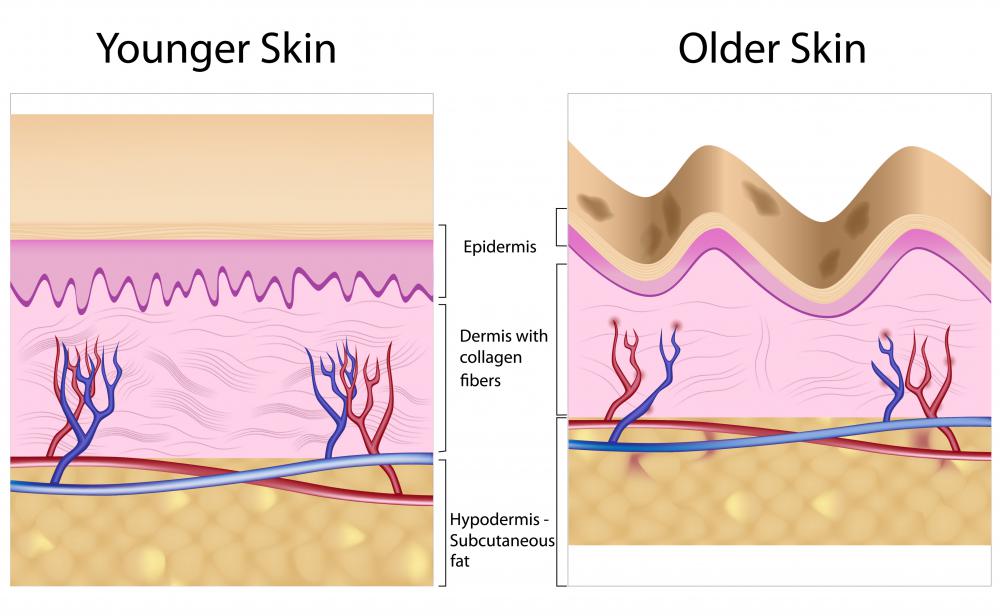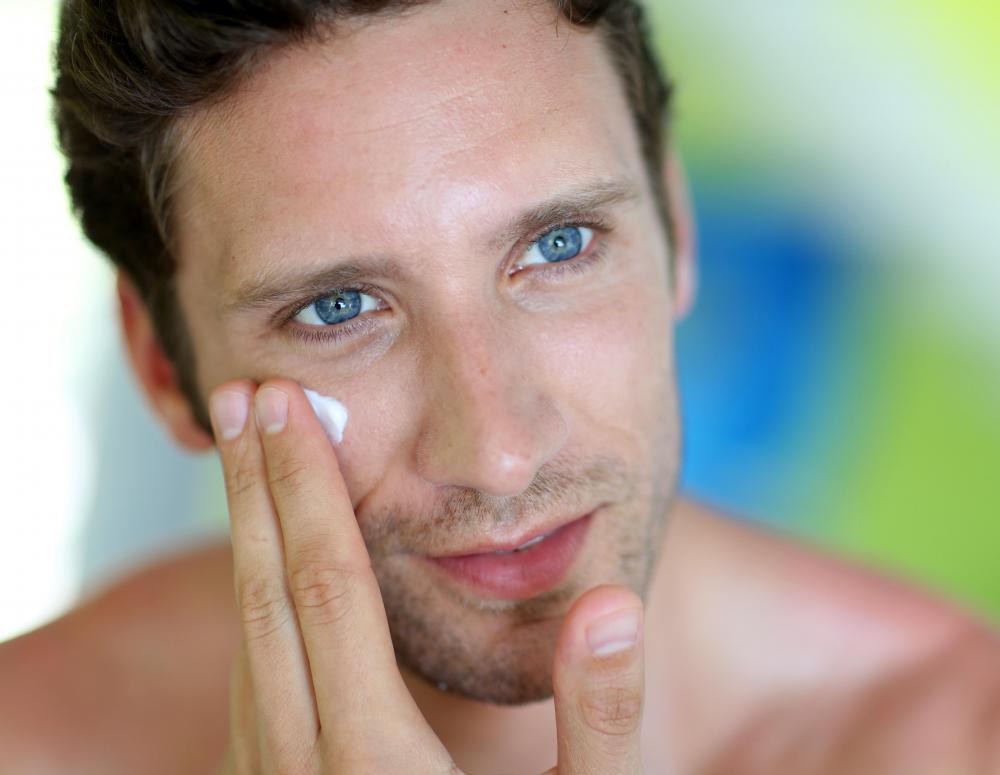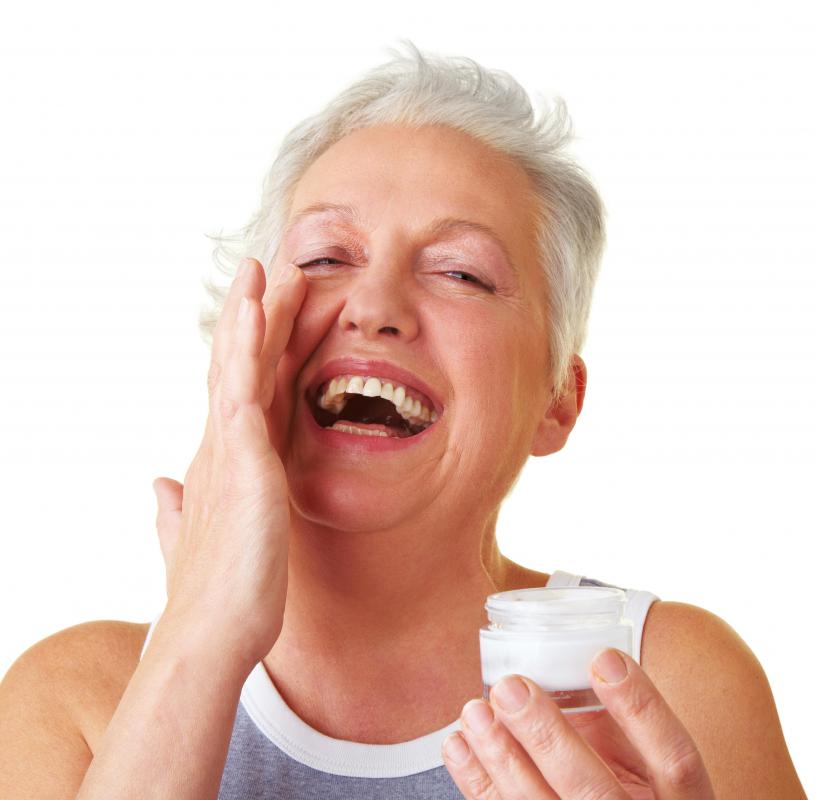At WiseGEEK, we're committed to delivering accurate, trustworthy information. Our expert-authored content is rigorously fact-checked and sourced from credible authorities. Discover how we uphold the highest standards in providing you with reliable knowledge.
How do I Choose the Best Retinol Night Cream?
Checking for potential drug interactions and conflicts with current products is a good start when choosing a retinol night cream. Consideration of skin type, the percentage of the active ingredient, any beneficial additives in the formula, season of use and time release also matters. Packaging is important, as well, because it influences the stability of the product. One of the last things people usually look at is the cost, with generic, over-the-counter products often providing very acceptable results without the high price tag of prescription-strength or name-brand choices.
Drug Interactions

Certain drugs are not good to use with retinol. When used with tetracycline antibiotics, for example, it can cause an increase in the pressure of the fluid around the brain. Combining it with anticoagulants can reduce their effectiveness, increasing bleeding risk, and medical professionals do not recommend using it with any hepatotoxic or liver-damaging substance, because high doses of retinol by itself can hurt the liver. Many medications designed to lower cholesterol can affect retinol absorption, as can the weight loss drug, orlistat.
Products in Use

Closely related to checking drug interactions is the need to look at other products you might already be using on your skin. It is not unusual for someone to use multiple skin products on their faces for different reasons, such as exfoliating or evening out skin tone, and that’s before other items such as sunscreen. Makeup makes the number of ingredients on the skin go up even more. For this reason, it’s a good idea to read the labels of what you already have to make sure the products won’t reduce effectiveness cause unnecessary irritation. It might be necessary to cut some items out of your routine once you start using the night cream.
Skin Type

Once you’ve looked at the other products you have and the drugs you are taking, the next step is to analyze the kind of skin you have. Manufacturers often create different formulas for skin care products to accommodate various skin types, and this holds true for retinol night creams. Ones made for those with dry skin, for example, often contain humectants, which are substances that absorb water and prevent moisture loss. Those for acne-prone skin often contain benzoyl peroxide, while those for people with oily skin frequently avoid an oil base.

Even though many people buy facial products based on a generalized concept of skin type, it’s possible for the skin to require more than one treatment. Someone can need an oil-free cream for the “T-zone” of the nose and forehead, for example, and a moisturizing one everywhere else. Some products are specifically designed for the area around the eye, as well, which tends to be thinner and more sensitive.
Active Ingredient Percentage

In general, people with sensitive or dry skin need a night cream with lower retinol percentage, but this can vary slightly based on the exact formula. The use of humectants, for example, can make a higher concentration acceptable for someone with dryness. Lower amounts also are more appropriate for people who are new to these creams. Many individuals successfully increase levels over time as their skin adjusts.
If you already are using one of these creams during the day, putting one on again at night might be too much for your skin. One option in this situation is to switch to using only the evening version. The other choice is to look for a night cream with a very low percentage of retinol.
Beneficial Additives
Part of the process of picking the right product is to see which options have additional beneficial substances. Common examples are Vitamin E, Vitamin C and alpha- and beta-hydroxy acids. These compounds usually have antioxidant properties, chemically exfoliate or provide some degree of soothing. Some, however, can treat specific problems, such as hydroquinone correcting uneven skin tone. As you age and your skin changes, you might find that you need different ingredients.
Season
One thing many people forget to consider when selecting the right product is that retinol can make the skin more sensitive to the ultraviolet rays from the sun. In the summer, creams with lower concentrations can be better for this reason. In the winter, when the air tends to be more dry, switching to a product that is oil-based or which has humectants can help.
Slow-, Regular- or Fast-Release
Manufacturers often adjust their night cream formulas to change how fast the retinol absorbs into the skin. Those with a slow-release design are better for those with dry or sensitive skin, because it prevents a sudden, high dose that can cause irritation. As your tolerance increases, the type of formula that works for you might shift.
Packaging
Sunlight and air exposure cause retinol to break down more quickly, so toward the end of your search, you should be looking for a product that comes in an opaque bottle with a pump or a tube. Many people find that this step greatly limits their choices, because so many manufacturers use jars or other clear containers. Following the dark-and-airtight rule is beneficial, even so, because the companies that adhere to it show that they really understand what to do to make the cream effective and long-lasting, which often means an overall better formula.
Cost
Many insurance companies don’t cover the cost of skin care products, and a prescription-strength retinol night cream usually has a higher concentration of the active compound. They generally are more expensive than over-the-counter versions as a result. Their higher price tag does not guarantee a better result, however, and many individuals find that a non-prescription or more generic option works just as well. If the main ingredients and percentages are the same, picking the cheaper product typically makes good financial sense.
AS FEATURED ON:
AS FEATURED ON:















Discussion Comments
@TunaLine: I've been using Vichy LiftActiv Retinol HA night cream over the past number of weeks! It's an excellent product and has won a number of awards, etc. I use it with their retinol eye cream as well! Both are awesome products!
@tunaline -- Have you tried Green Cream Retinol products? I've had a good experience with those, although I know they don't work for everybody. Worth a try though.
It's important to use those retinol face creams according to the instructions though. There are actually a number of retinol side effects that the cosmetics companies generally forget to tell you about.
For instance, most people get mild to severe peeling the first time they use a retinol skin cream, especially it it's one that is used on delicate parts of the face, like the eyes.
Other retinol side effects include tenderness, extreme photo-sensitivity (sensitivity to light) blistering, and inflammation.
Kind of makes you want to think twice before putting that stuff on your face, right?
Now, I'm all for retinol anti wrinkle creams -- when used properly, I know that they can have great effects, if you can get over that first round of peeling and pain.
However, it is so important to only use an amount prescribed by a dermatologist, and to not slather it on. More is not better, in this case; in fact, more could send you to the hospital.
So get rid of your wrinkles, by all means, but just be smart about it.
I have been using a retinol 0.5 percent refining night cream for about three months now, and it doesn't seem to be doing anything for me.
Should I switch to a stronger type of retinol skin cream, or should I try a different brand? I'm not really up on the ins and outs of retinol products, but I really want to start getting rid of my wrinkles before they good too serious.
I usually moisturize my face at night, so if somebody could tell me what the best night cream with retinol is, I would totally appreciate it. Any retinol face cream is OK, it doesn't have to be night cream, but I'd prefer a night cream, if anybody knows of one.
Post your comments